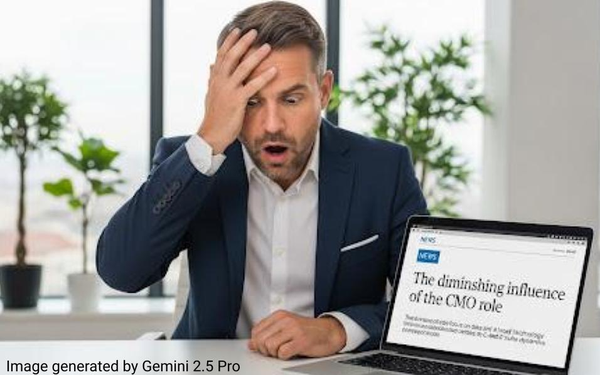
A new McKinsey report confirms what many CMOs already suspect:
Their influence is shrinking, their budgets are shrinking, and their seat at the table is in jeopardy. Robert Tas, a partner at McKinsey and one of the report’s lead authors, says the disconnect
between CMOs, CFOs, and CEOs is only getting worse—and it’s costing companies growth. In this candid conversation, he shares what the data reveals, where marketing leaders are going wrong,
and how to make the role indispensable again. Spoiler: It starts with ditching buzzwords, proving ROI, and thinking more like a general manager than a brand evangelist.
This
interview has been edited for length and clarity.
Marketing Daily: Your findings are kind of
…brutal. Why has the CMO role lost its influence?
advertisement
advertisement
Robert Tas: It's a perfect storm. CMOs have created a
communication gap with CEOs—too many new metrics, too much jargon, and not enough connection to business outcomes. They’re not speaking the language of the CEO or CFO, and they’ve
lost credibility. Measurement is a mess. We’ve created black boxes with new models every year, and it confuses the C-suite. Add in the explosion of new roles—chief digital officers, chief
customer officers—and the CMO is just one piece of a very fragmented puzzle.
Marketing Daily: You say
marketing has become disconnected from growth. Why?
Tas: CEOs often tell us, “The CMO says the brand
metrics are great, but sales are down.” That disconnect kills trust. Sometimes marketing is doing good work—but on the wrong priorities. There’s also a perception gap: CEOs think
they understand marketing, but CMOs say they don’t. And this research, conducted with the Association of National Advertisers, asked these questions of execs at the same companies, by the way.
And both can be right. CEOs focus on short-term revenue. CMOs talk about brand love. We need CMOs to connect those dots better.
Marketing Daily: Your new report shows more
CMOs are getting cut from the C-suite or buried under layers of new titles. What’s driving that?
Tas:
It’s partly performance, partly communication. Companies that have a single customer-centric executive reporting to the CEO perform better. But that title isn’t always CMO. The key is
ownership. The CMO should be the company’s customer expert. But too often, they don't even own the experience. They drive people to the store—but have no idea what happens next.
That’s not sustainable.
Marketing Daily: So who is doing it well?
Tas: The best CMOs are those who can act like general managers. They speak the language of business. They meet regularly with the
CEO. They co-create measurement systems with their CFO. They test, validate, and—here’s the kicker—they’re willing to say, “That campaign didn’t work, let’s
stop spending.” That’s credibility. One of my favorite quotes from a CEO: “I don’t want to hear about brand awareness unless that’s what we agreed as a business
objective.”

Marketing Daily: You talk a lot about CMOs needing to “own the customer.” What does that actually
mean?
Tas: It means being the custodian of the customer at the executive table. Someone has to connect the
dots across channels and business units. You don’t have to own every piece—but you need visibility, authority, and insight. Without that, you’re just the ad person. And no one wants
that job.
Marketing Daily: The CMO/CFO alignment sounds great in theory. But is it happening?
Tas: Rarely—but when it does, it’s powerful. CMOs need to stop chasing one perfect metric. There
isn’t one. What they need is a measurement system that maps marketing activities to business impact. And they need their CFO to validate it. That’s how you get the rest of the C-suite on
board. When the CFO signs off on brand investment, suddenly, people stop questioning it.
Marketing Daily:
Let’s talk about career survival. What makes a CMO indispensable right now?
Tas: Three things. First,
learn the business. Know how your company makes money. Listen to the earnings calls. Speak in outcomes. Second, partner with the CFO. If you can’t explain how two points of brand lift translate
into revenue, you’re in trouble. Third, pressure-test everything. Show that you’re validating every dollar. That’s what makes you credible.
Marketing
Daily: Is it time for CMOs to think more like general managers?
Tas: 100%. Many CMOs are great at
marketing. But once you’re in that seat, you’re not a channel expert anymore. You’re a business leader. You need to think in tradeoffs. Sometimes that means saying:
“We’re going to shift ad dollars to open more stores.” That kind of thinking builds trust and influence.
Marketing Daily: How do you see the brand vs. performance divide affecting all this?
Tas: That divide has done us no favors. We’ve turned marketing into a fight between short-term and long-term tactics. Of course, CEOs want to invest in what drives
immediate sales—it’s measurable. But that’s our fault for not communicating brand value in business terms. If you believe in brand, prove it. Test it. Make it hurt. Turn it off and
see what happens. That’s how you make it real.